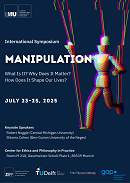International Symposium: Manipulation – What It Is, Why It Matters, and How It Shapes Our Lives
Date
July 23 – 25, 2025
Location
Center for Ethics and Philosophy in Practice
LMU Munich, Main Building, Room M 210 (LMU room finder)
Geschwister-Scholl-Platz 1, 80539 Munich
Registration
https://eveeno.com/symposium-manipulation
Theme
Manipulation is a pervasive but poorly understood feature of our lives. It influences how we interact online, shop, vote, and even fall in love. From subtle marketing tactics to political messaging, and from nudging interfaces to AI-driven recommendation systems, manipulation seems to be everywhere and may be growing harder to detect. Technological advances such as deepfakes, algorithmic persuasion, and AI personalisation have made the need to understand manipulation more urgent than ever. Yet despite its practical importance, systematic philosophical inquiry into manipulation is still in its early stages.
Philosophical progress has been made, particularly on two foundational questions: (1) What distinguishes manipulation from other forms of influence, such as persuasion or coercion? (2) When, and why, is manipulation morally problematic? Competing answers to these questions are emerging, but no consensus has formed. Meanwhile, philosophical work in ethics, political theory, and the philosophy of technology increasingly engages with manipulation, but often without engaging with these emerging theories. This presents a dual challenge: to determine which theory best accounts for manipulation, and to explore how such theories can inform broader normative debates.
The year 2025 marks a turning point for the international debate, with the publication of the first two English-language monographs on the topic, by Robert Noggle and Shlomo Cohen, respectively. Both monographs offer comprehensive but competing accounts of the nature and normative status of manipulation. Alongside these, a new theory developed by Michael Klenk proposes yet another framework. This symposium takes the occasion to critically examine these three competing accounts and to assess their implications both within the philosophical study of manipulation and for broader debates in ethics, political philosophy, and the ethics of AI.
Aims
The symposium seeks to:
- Critically evaluate the leading philosophical theories of manipulation
- Compare and contrast the views of Noggle, Cohen, and Klenk
- Explore connections between manipulation and debates in normative ethics, political philosophy, and ethics of AI
- Foster a growing intellectual community engaged in the philosophical study of manipulation and influence
Symposium
Each day will focus on one theory. The featured author will introduce their view, followed by at least three prepared commentaries and extended discussion. The symposium is pre-read: selected chapters will be distributed to participants in advance.
Day 1: Robert Noggle — The Mistake Account
Day 2: Shlomo Cohen — The Deflationary Account
Day 3: Michael Klenk — The Indifference View
Keynote Speakers
Robert Noggle (Central Michigan University)
Shlomo Cohen (Ben-Gurion University of the Negev)
Preliminary Programme
Day 1, July 23
| 09:15-09:30 | Opening by Michael Klenk (LMU Munich / TU Delft) |
| 09:30-10:45 | Keynote by Robert Noggle (Central Michigan University) |
| 10:45-11:15 | Break |
| 11:15-12:00 | Presentation by Gyburg Uhlmann (University of Technology Nuremberg) |
| 12:00-13:30 | Lunch |
| 13:30-14:15 | Presentation by Ron Aboodi (LMU Munich) |
| 14:15-14:45 | Break |
| 14:45-15:30 | Presentation by Silvia Milano (LMU Munich / Exeter University) |
| 19:00 | Symposium dinner (Restaurant RILA, Kaulbachstr. 33, 80539 München) |
Day 2, July 24
| 09:30-10:45 | Keynote by Shlomo Cohen (Ben Gurion University Negev) |
| 10:45-11:15 | Break |
| 11:15-12:00 | Presentation by Eric-John Russell (Potsdam University) |
| 12:00-13:30 | Lunch |
| 13:30-14:15 | Presentation by Vladimir Krstic (United Arab Emirates University) |
| 14:15-14:45 | Break |
| 14:45-15:30 | Presentation by Sandy Berkovski (Bilkent University) |
| 19:00 | Dinner option (at own expense, Restaurant Cyclo, Theresienstr. 70, 80333 München) |
Day 3, July 25
| 09:30-10:45 | Presentation by Michael Klenk (LMU Munich / TU Delft) |
| 10:45-11:15 | Break |
| 11:15-12:00 | Presentation by Gabriel DeMarco (Oxford University) |
| 12:00-13:30 | Lunch |
| 13:30-14:15 | Presentation by Katharina Sodoma (LMU Munich) |
| 14:15-14:45 | Break |
| 14:45-15:30 | Presentation by James Edwards (Manchester University) |
| 19:00 | Dinner option (at own expense, Biergarten Chinesischer Turm, Englischer Garten 3, 80538 München) |
Financial Support
The symposium is generously funded by the Thyssen Foundation and the German Society for Analytic Philosophy and administratively supported by the Munich Centre for Ethics and Philosophy in Practice.
Organiser and Contact
Dr. Michael Klenk
Assistant Professor of Philosophy, TU Delft
Humboldt Fellow, LMU Munich


